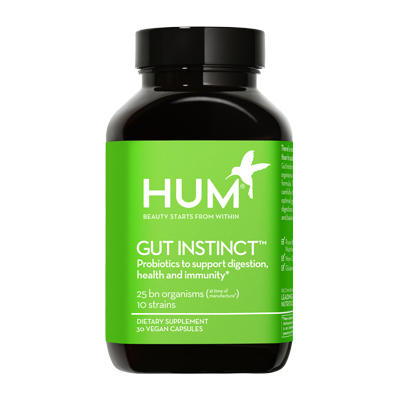Medically Reviewed By
Gaby Vaca-Flores, RDN, CLE
Registered Dietitian Nutritionist
Bloated, gassy, or running to the bathroom more than usual? It’s time to check in on your stress levels. Jessica Bippen, MS, RD, uncovers how stress affects your digestion and how to manage both.
Have you ever had butterflies in your stomach when making a tough decision? Or maybe you’ve had to give a speech but suddenly found yourself running off to the bathroom only moments before you present. Both of these are perfect examples of how stress impacts digestive health.
That’s right! There’s a profound link between stress and gut health. Your digestion gets thrown off when stress goes unmanaged, making for uncomfortable and sometimes even embarrassing moments. But it doesn’t have to be this way! Read on to learn more about the link between stress and digestion. Plus: effective ways to proactively optimize gut health and manage stress.

Your Body’s Response to Stress
Stress is a natural mental and physical reaction to many situations that arise in life. In turn, your body is designed to handle stress. For instance, in short-term instances, stress can be beneficial to your health. Your body responds to stress by releasing hormones that increase heartbeat and send blood rushing to the areas that need it most in an emergency, such as your muscles, heart, and lungs. You may be familiar with the term “flight or fight,” during which stress puts your body in survival mode. When the stress goes away, your body returns back to its normal state. That being said, for many people, stress is constant, meaning their body stays in a constant survival mode. Your body works in overdrive in order to “protect” you, yet this prolonged state of stress can take its toll on your health. In both cases, stress affects your body on a cellular level. Even a small amount of stress can trigger mental and physical symptoms. In the short-term, this change could go unnoticed, but long periods of stress can cause a number of undesirable symptoms. Symptoms of chronic stress include:UNDERSTANDING HOW STRESS AFFECTS DIGESTION
You can’t feel your best when you’re stressed to the max and feeling backed up and bloated. It’s important to consider the link between stress and digestion. Believe it or not, stress can impact every part of your digestive system, including your esophagus, stomach, and intestinal tracts. Its effects on your digestive system can vary depending on the length of time in which you experience stress.Short-Term Stress
This sudden onset of short-lived stress can cause you to lose your appetite and your digestion to slow down. So if you feel stressed and eat much more than usual, it may be a coping mechanism you’ve adopted. This change in appetite and food intake can result in heartburn or acid reflux. You may start to notice gastrointestinal (GI) issues like bloating, constipation, diarrhea, indigestion, or an upset stomach. This occurs because stress can affect how quickly food moves through the body. Additionally, some individuals may even experience nausea or vomiting.Chronic Stress
Unmanaged stress over extended periods of time may lead to more serious issues. While it can vary among individuals, research shows a link between stress and irritable bowel syndrome (IBS) and other GI conditions. For those who already suffer from digestive issues, stress can exacerbate symptoms. It’s thought this happens due to the nerves in the gut becoming more sensitive during times of stress. Other possibilities include changes in gut microbiota, changes in how quickly food moves through the gut, and/or changes in gut immune responses.The Gut + Microbe connection
We can’t talk about digestion without mentioning the importance of a healthy gut microbiome. Research shows an intricate link between stress, digestion, and gut bacteria. For instance, we know times of prolonged stress can negatively impact your microbiome. But interestingly enough, it works both ways. Certain strains of bacteria in your gut can also impact the way neurotransmitters in the body. The gut-brain axis describes this dual relationship and ongoing communication between the activity in both the gut and the brain. Stress can affect this brain-gut communication and may be the trigger of how easily you feel pain, bloating, and another gut discomfort. In addition, a team at Ohio State University found that stress can actually change the composition, diversity, and number of intestinal bacteria along with greater numbers of potentially harmful bacteria. So having a diverse microbiome can actually help your body manage stress more effectively!
How to Achieve Optimal Gut Health
In order to help manage stress, it’s important to optimize your gut health on multiple fronts. Doing so includes focusing on proper nutrition and probiotics. Be sure to incorporate fiber-rich foods and balance them out with quality protein and healthy fats to support your gut microbiome. Research also shows that eating a wide variety of fresh produce can improve the diversity of your gut bacteria. Still, eating well isn’t always enough. Because there are so many factors that can throw off the delicate balance of our microbiome, you often need extra support. Here’s where probiotics come in! Using quality probiotics is one of the best ways to help balance your gut bacteria. Choose a probiotic like Gut Instinct, which is specifically formulated to support the comprehensive health of your body and digestion with 10 strains of probiotics and 25 billion organisms in each capsule. The live-strain probiotics in Gut Instinct are clinically researched to support digestion and improve overall health. For instance, bifidobacterium longum helps stabilize the acidity of the GI tract and inhibit the growth of harmful bacteria. It’s also one of the species researched for its ability to decrease stress levels and improve memory.How to Manage Stress
In addition to optimizing gut health, incorporate daily stress management practices to keep stress—and accompanying digestive issues—at bay. The best ways to reduce stress can vary from person to person. Still, some standard stress-relieving practices include:- Movement and exercise
- Yoga
- Meditating
- Talking with a friend, loved one, or therapist
- Journaling
- Petting a furry friend
- Laughing
- Incorporating adaptogens
- Volunteering or performing an act of kindness
More like this










